
Apantesis is a genus of tiger moths in the family Erebidae first described by Francis Walker in 1855. They are found in North and Central America.

Cirrhophanus is a genus of moths of the family Noctuidae. The genus was erected by Augustus Radcliffe Grote in 1872.

Zanclognatha is a genus of litter moths of the family Erebidae. The genus was erected by Julius Lederer in 1857.
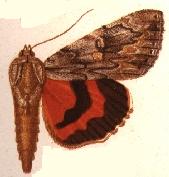
Catocala coccinata, the scarlet underwing, is a moth of the family Erebidae. The species was first described by Augustus Radcliffe Grote in 1872. It is found in southern Canada and the eastern United States, following river valleys onto the Great Plains and down to Florida.

Euxoa catenula is a species of moth of the family Noctuidae first described by Augustus Radcliffe Grote in 1879. It is found in North America from southern Saskatchewan west to southern Vancouver Island, south to Kansas, New Mexico, Arizona and southern California.
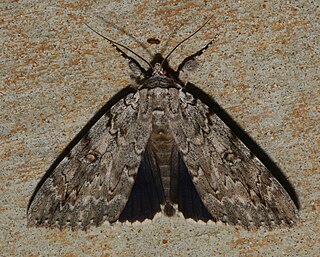
Catocala robinsonii, or Robinson's underwing, is a moth of the family Erebidae. The species was first described by Augustus Radcliffe Grote in 1872. It is found in North America from southern Ontario and New Hampshire south to Florida west to Oklahoma, Missouri and Arkansas and northward to Illinois, Indiana, and Michigan.
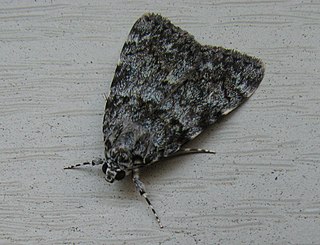
Catocala lineella, the lineella underwing, little lined underwing or steely underwing, is a moth of the family Erebidae. The species was first described by Augustus Radcliffe Grote in 1872. It is found in North America from Ontario and Quebec south to Florida west to Texas and north to Ohio.

Schinia nuchalis, the spotted sage moth, is a moth of the family Noctuidae. The species was first described by Augustus Radcliffe Grote in 1878. It is found from the Great Plains and Great Basin, from southern Saskatchewan, Alberta and British Columbia south to northern Arizona. The Eurasian Schinia scutosa is no longer considered a synonym of Schinia nuchalis.

Isogona tenuis, the thin-lined owlet, is a moth of the family Erebidae. The species was first described by Augustus Radcliffe Grote in 1872. It is found from Ontario, Wisconsin, Ohio and New Jersey, south to Florida and Texas.
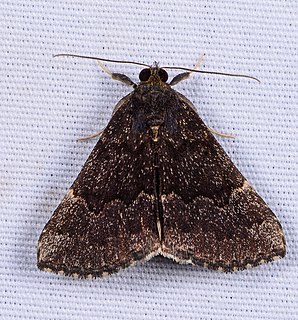
Hypena sordidula, the sordid hypena or sordid bomolocha moth, is a moth of the family Erebidae. The species was first described by Augustus Radcliffe Grote in 1872. It is found in North America from Quebec and Maine south to northern Florida and Texas, west to Louisiana and Kansas, north to Manitoba.

Colobochyla interpuncta, the swamp belle or yellow-lined owlet, is a moth of the family Erebidae. The species was first described by Augustus Radcliffe Grote in 1872. It is found in North American wetlands from Wisconsin to Nova Scotia south to Florida and Texas.
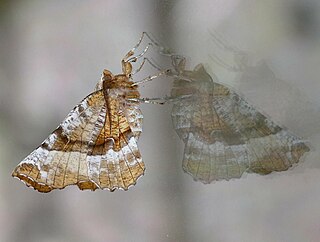
Selenia kentaria, commonly known as Kent's thorn or Kent's geometer, is a moth of the family Geometridae. The species was first described by Augustus Radcliffe Grote and Coleman Townsend Robinson in 1867. It is found in eastern and central North America.
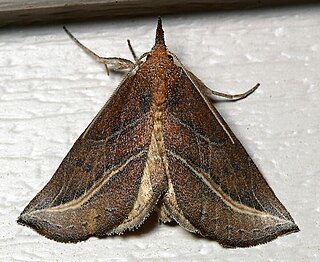
Phyprosopus callitrichoides, the curve-lined owlet, is a moth of the family Erebidae. The species was first described by Augustus Radcliffe Grote in 1872. It is found in the US from New Hampshire to Florida, west to Montana and Texas.

Trichordestra legitima, the striped garden caterpillar, is a moth of the family Noctuidae. The species was first described by Augustus Radcliffe Grote in 1864. It is found in eastern North America, from Newfoundland to Florida, west to Texas, north to Saskatchewan.
Cirrhophanus pretiosa is a moth of the family Noctuidae first described by Herbert Knowles Morrison in 1875. It is found in North America, including Texas, Oklahoma, and Florida.

Euphyes bimacula, the two-spotted skipper, is a butterfly of the family Hesperiidae. It is found in North America, from northeast Colorado and western Nebraska; eastern Nebraska east to southern Quebec; southern Maine south to central Virginia; coastal plain south to Georgia; and the Gulf Coast.

Lycomorpha pholus, the black-and-yellow lichen moth, is a moth in the family Erebidae. It is found in North America from Nova Scotia to North Carolina, west to South Dakota and Texas. The habitat consists of short-grass prairie.

Crambus bidens, or Biden's grass-veneer, is a moth in the family Crambidae. It was described by Philipp Christoph Zeller in 1872. It is found in North America, where it has been recorded from Massachusetts, New York, Ontario, New Jersey, Quebec, Michigan and Alberta. The habitat consists of bogs.
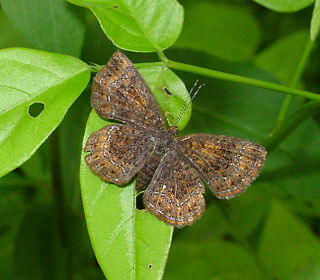
Calephelis borealis, commonly known as the northern metalmark, is a butterfly of the family Riodinidae. It ranges through western Connecticut south through west-central Pennsylvania; central Appalachians and Ohio River Valley. Isolated populations are also found in southwest Missouri and eastern Oklahoma. The habitat consists of open woodland streams near serpentine, shale or limestone barrens.

Stiriini is a tribe of owlet moths in the family Noctuidae. There are about 16 genera and more than 90 described species in Stiriini.

















